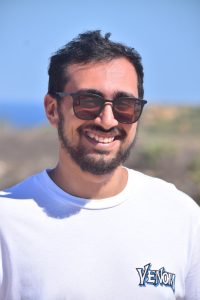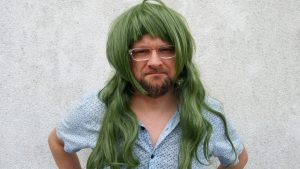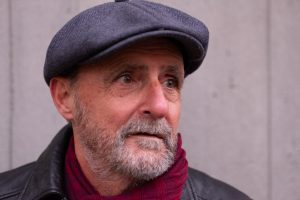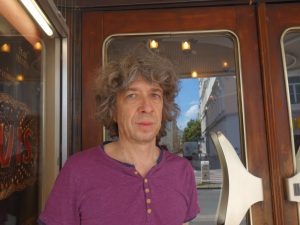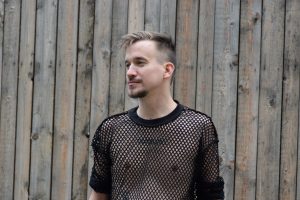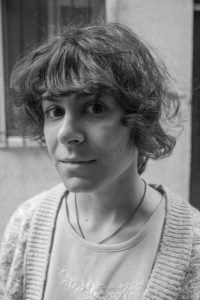Jake Buttigieg
Jake Buttigieg (2000) is a Master’s student at the Faculty of Law, University of Malta who received his B.A. in 2022 with a thesis on the semiotic analysis of Maltese criminal law. He writes mainly in Maltese, translates poetry from English, Italian, French and Russian, and also translates contemporary Maltese poetry into English. In 2020, he published the text “B’subgħajh mkemmxa faqqa’ l-iswiċċ tad-dawl” (He flicked the switch with his wrinkled finger) in Leħen il-Malti (The Maltese Voice), and in the following years he published poetry translations of Boris Ryzhy’s “Hawn hu l-iswed” (It’s black here) and Vladimir Mayakovsky’s “Isma!” (Listen!). He is particularly interested in exploring literary themes of time and memory. He places both in colonial and post-colonial contexts, considering memory and time as a means of achieving reconciliation, of explaining and motivating contemporary human action. In 2019, he participated in the Taħżiż programme, and his work on this occasion subsequently resulted in his first publication of the text “Tlift xogħli llum, qed nibża’, mort nixtri u niġbor lil Greg mill-mużew” (Today I lost my job, I’m scared, I went shopping and to the museum to look for Greg).
Ariane Koch
Ariane Koch (Basel, 1988) is a Swiss writer and theatre performer. After graduating from the Basel University of Art and Design, she pursued Interdisciplinary University Studies in Theatre in Berne, Philosophy in Basle and Literary Writing at Berne University of the Arts. She is a member of the free theatre group GKW (Moïra Gilliéron, Ariane Koch and Zino Wey), which carries out “collaborative projects between metaphysics and poetic science fiction, mostly dealing with disappearance, humanity and the future past”. She writes texts for theatre and performance, radio dramas and literary fiction, often in the context of GKW or with artist Sarina Scheidegger. She was the founder and editor of the cultural magazine Lasso (2010–2015), a platform for art and literature. She has performed in Basel, Berlin, Istanbul, Cairo and Moscow. She has received several grants, including a grant from the Literary Colloquium Berlin (2014) and the International Centre for Arts in Paris (2020). Since 2019, she has been teaching at the Institute for Aesthetic Practice and Theory in Basel. For her debut novel Die Aufdrängung (2021; Overstaying), she received, among others, the Aspekte Literature Prize (ZDF) and the Swiss Literary Award.
Wojciech Kuczok
Wojciech Kuczok (Chorzów, 1972) is a Polish writer, poet, screenwriter, film critic and caver. He studied Cinematography at the University of Silesia in Katowice. In the 1990s he was a member and author of the poetry group Na Dziko. Since 1992 he has been publishing poems and short stories in the local cultural and literary press. He has published texts on film, been a columnist for Rzeczpospolita, Metropol, Gazeta Wyborcza, Przegląd Sportowy and Newsweek. As a speleologist, he has discovered two caves in Poland and has been involved in the exploration of many others at home and in Europe. In 2013, he received the Kolos Prize for his speleological work. His most acclaimed film works include the screenplays for the feature films Pregi (2003; Punches), Senność (2008; Sleepiness) and Zbliżenia (2014; Close-ups). He was a German Academic Exchange Service (DAAD) scholarship holder in 2009 and 2010, during which time he wrote the novels Spiski (2010; Conspiracies) and Poza światłem (2012; Beyond the Light). He has written several works of poetry, prose and essays, and many of his books have been translated, most often his novel Gnój (2003; Muck), which can be read in Slovenian, translated by Nikolaj Jež (Didakta, 2009). It is “a stylistic masterpiece about individual passivity, the inability to make decisions, the raising of lukewarm ideals into rottenness. The novel is written in Silesian dialect, as the author is strongly connected to his Silesian roots, and reflects the patriarchal social structure, the morbid introvertedness and the inability of the individual to avoid the collective memory of his own upbringing.”
Silke Scheuermann
Silke Scheuermann (1973) was born in Karlsruhe and studied literature in Frankfurt, Leipzig and Paris. She is considered one of Germany’s greatest living poets. In 2001 she published her first collection of poems, Der Tag, an dem die Möwen zweistimmig sangen (The Day the Gulls Sang in Two Voices). Her award-winning novel Die Stunden zwischen Hund und Wolf (The Hour Between Dog and Wolf) was published in 2007. In 2014, she received the Hölty-Preis, the highest honour in the field of poetry, for her collection of poems Skizze von Gras (Sketch of Grass). She has also made a name for herself with her 2005 collection of exquisite short stories Reiche Mädchen (Rich Girls) and with her extensive 2016 Bildungsroman, in which she thematises the petty-bourgeois milieu, Wovon wir lebten / What We Have Lived On. All her works are published by Schöffling. Critics point out that it is rare for someone to have such an extraordinary talent in the field of poetry and prose. She has lectured on her poetics in Frankfurt and Bamberg, among other places, and has received numerous honours and fellowships.
Shpëtim Selmani
Shpëtim Selmani (Pristina, 1986) is a Kosovar writer and actor. He studied Sociology at the University of Prishtina and holds an MA from the Academy of Arts. He performs in national and international theatres and, in addition to his acting career, he is active as a journalist, poet, writer and playwright. He is a regular contributor to the alternative blog S’bunker. In 2014, he was a guest of a literary residency in Belgrade, three years later he was a guest in Tirana, and in 2017 he participated in the Leipzig Book Fair. In his fiction, Selmani writes about everyday life, encounters and relationships; he also reflects on literature and world events, nationalism, materialism and other -isms, but above all he writes about great love. He has published four books to date, Shënimet e një Grindaveci (2015; Hot Blood Notes), Selected poems, 2010–2017: Poetry in Time of Blood and Despair, novel Libërthi i dashurisë (2019; Love Notebook), for which he was awarded the European Union Prize for Literature in 2020 and
Balada e Buburrecit (2022; The Ballad of Ant). The latter has been translated into Italian and published by the Publishing House Crocetti Editore.
Max Sessner
Max Sessner (1959) was born in Fürth and has lived in Nuremberg, Würzburg and Munich. Since 2008 he has been working as a bookseller in Augsburg. In his texts, he focuses on everyday things that he observes and feels close to, which sometimes veer into the surreal, the fairy-talesque or the magical. His poems have been translated into Spanish and English, among other languages. In 2019 he received the Rotahorn prize of the City of Graz. He has published eight collections of poetry, including Warum gerade heute (Why Especially Today?) (Droschl 2015), Langsame Männer (Slow Men) (Stadtlichter Presse 2015) and Das Wasser war gestern (The Water of Yesterday) (Edition Azur 2019).
Thomas Stangl
Thomas Stangl (1966) was born in Vienna, where he still lives today. He studied Philosophy and Hispanic Studies. He became famous with his first novel, a sweeping account of crossing the Sahara on the way to the mythical Timbuktu, Der einzige Ort (The Single Place) (2002, Droschl). In 2007, he was awarded second prize in the Ingeborg Bachmann Competition; among other prizes, he was granted the Cultural Prize of the Republic of Austria for Literature in 2022. He is one of the most acclaimed Austrian writers, and has even been described as the successor to Robert Musil and Thomas Bernhard. Among his many works, his novel Was kommt (What Awaits Us) (Droschl 2009) explores the possibilities of resistance and the possibility of a different life on the margins of society. Other works include Die Geschichte des Körpers (The History of the Body), a collection of short stories about transience, and Regeln des Tanzes / The Rules of Dance (2013), a novel about Vienna in three different periods. His most recent publications include Quecksilberlicht (The Light of Mercury) (2022, Matthes & Seitz), a novel about fragments from the lives of very different people, from a Chinese emperor to a girl in Austria at the beginning of the twentieth century, and a collection of short prose glimpses Diverse Wunder (Various Wonders) (2023, Droschl).
Jan Škrob
Jan Škrob (Prague, 1988) is a Czech poet and translator. He has published the poetry collections Pod dlažbou (2016; Under the Pavement), Reál (2018; Reality) and Země slunce (2021; Land of the Sun). In 2018, he won the (Czech-German) Dresden Lyric Award for his first collection (alongside German poet Bastian Schneider), and was nominated for the Jiří Orten Prize for his second collection. He translates mostly English lyric poetry by various authors such as Wole Soyinka and Denise Levertov. Jan Škrob’s apocalyptic visions are reminiscent of the great poets of the past. In his poetry, he seeks a balance between the spheres of the personal and the political, between fiction and reality. He is both a radical leftist and a committed Christian, and his lyric poetry is faithful to traditional and formal poetry. In his literary work, deep faith confronts conflict and reality, misunderstandings and doubts. Jan Škrob has participated in several international literary gatherings, including the Novotvar Festival (Bratislava, 2018), Transpoesie (Brussels, 2019) and the World Poetry Festival in Patras (2022). His poems have been translated into German, English, French, Polish, Dutch, Greek, Lithuanian, Slovenian and Croatian and published in national and international journals and anthologies. He is a member of the Association of Czech Writers and the Association of Independent Authors.
Tonia Tzirita Zaharatu
Tonia Tzirita Zacharatou (Crete, 1993) studied Law and Comparative Literature. She is an assistant professor at the Department of Comparative Literature of the Faculty of Arts of the Aristotle University of Thessaloniki and is active as a literary translator. In 2020, she published Δεύτερη νεότητα (The Second Youth), a collection of poetry published by Thraka in Larissa, which, before that, received the prize for an unpublished first poetry collection. This was followed by Anagnostis (Reader) literary magazine’s prize for the best poetry debut (2020) and the Jean Moréas Prize (2021), for a female poet’s debut. The poem “River, Yours” was, with other prize-winning poems, included in the project On the Barbecue, Poetry on Climate Change, organised by The Stavros Niarchos Foundation Public Humanities Initiative at Columbia University in New York and the literary journal Thraka. In March 2023, she was a guest of the Echo III – For memory’s sake European Writers’ Residency in Tirana. She has participated in several literary festivals in Greece. She is in the organising committee of the thematic festival on gender and literature, Purple Jellyfish. She has translated the collection Adriano by the Portuguese poet Tatiana Faia. Her texts are available in print and in electronic formats and have been translated into Portuguese and English. She lives and works in Athens.

